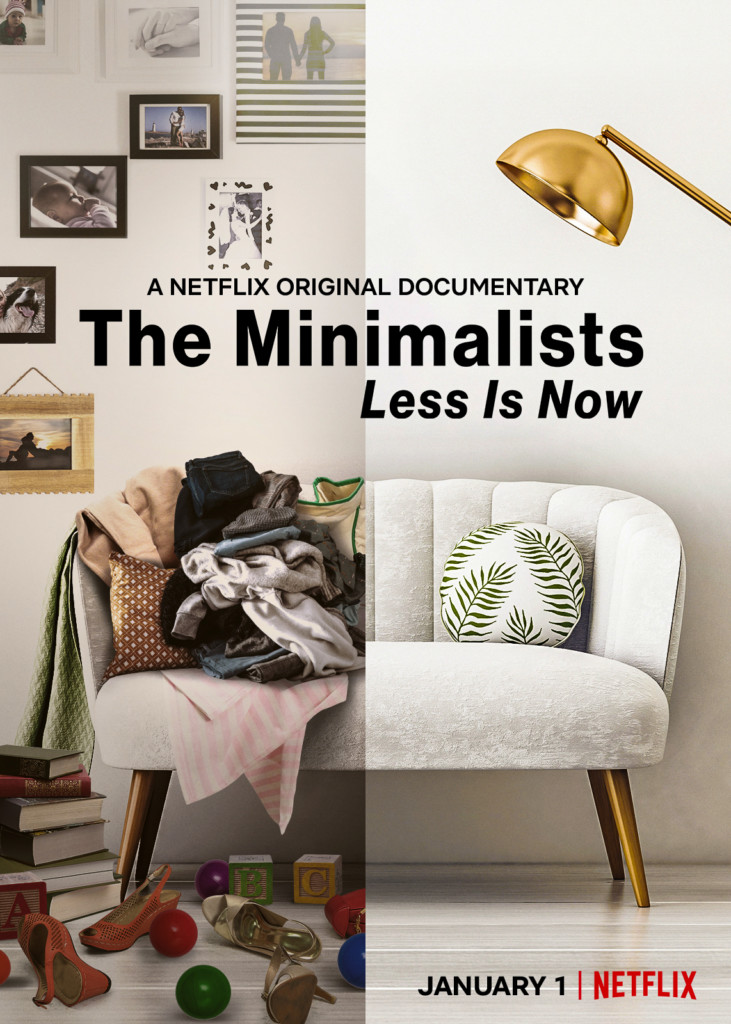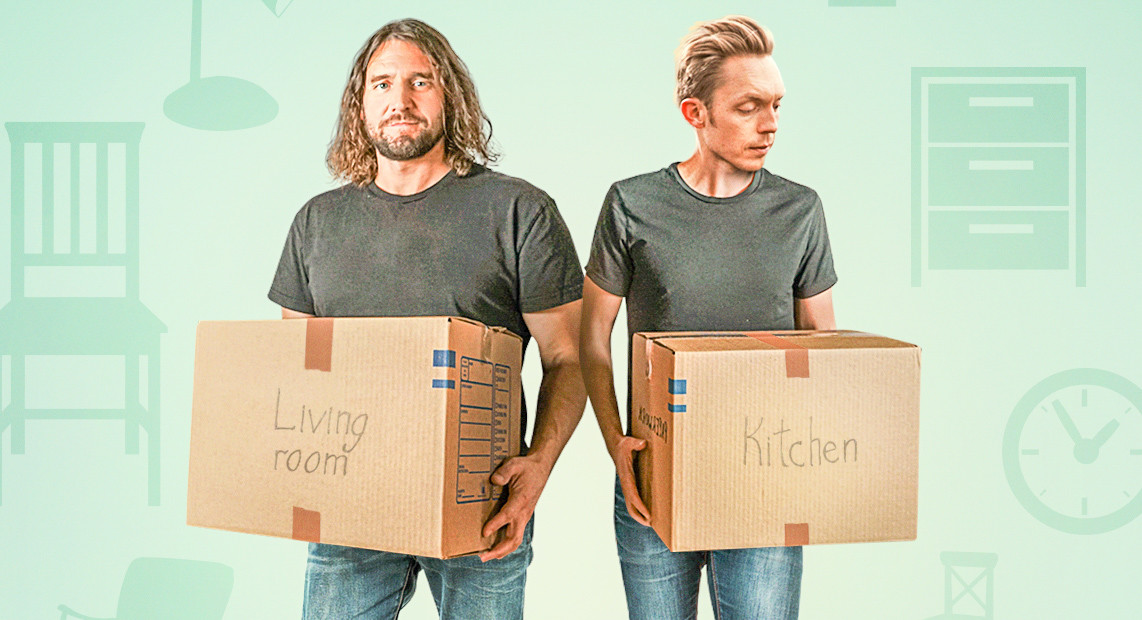By Greta Chiocchetti
As the most chaotic year in recent memory (finally) comes to a close, many of us are finding ourselves re-evaluating what’s truly essential in our lives. For Ryan Nicodemus and Joshua Fields Millburn, executive producers and stars of the upcoming Netflix documentary “The Minimalists: Less is Now,” paring down has actually led to more—more physical space where there once was clutter, but also more proverbial space for the things in life that matter most.
The childhood friends, known by their international fanbase of more than 20 million as “The Minimalists,” grew up poor in Dayton, Ohio, and went on to pursue demanding corporate careers. After realizing that making money with the sole purpose of acquiring more stuff wasn’t bringing them fulfillment, they embarked on a life-changing journey of living with less. Their first Netflix documentary, “Minimalism,” which debuted in 2016, focused on telling the stories of other minimalists around the country, but this time audiences get a more intimate look into Nicodemus and Millburn’s personal transformations.
In an interview with Art U News, Nicodemus shared what it means for “Less is Now” to debut at this time in history, his personal intentional living journey, and how to give and receive gifts as a minimalist.

What does it mean for “Less is Now” to be debuting in the midst of this pandemic?
With the pandemic, living intentionally is more important than ever. Because before the pandemic, and even a little bit during the pandemic, we have overloaded our lives with burdens, whether it’s stuff, or debt, or obligations, or distractions, or toxic relationships, stress—I mean, these are all choices that we’ve made, and that we are certainly capable of changing. I think the pandemic has really brought these burdens to light. We are faced with the closest relationships to us in our household, and we see these people way more now than we did before. And then, not to mention, all of the stuff that we have in our lives. I mean, we’re looking at that on an everyday basis; you can’t really hide from those burdens.
[The documentary] is timely in the sense that people are faced with a lot of decisions that they’ve made up to this point. And I really think that this movie can help people. They can do one or two things: watch the movie, and they’ll say, “Wow, I’ve made some really good decisions. And thank God, I didn’t get in trouble like those Josh and Ryan guys.” Or they’re gonna watch the documentary and they’re gonna be like, “Oh, wow, I’ve really made some choices that I’m not completely happy with.” And hopefully, this documentary is an inspiration for people to start making different choices.
Even before the recent pandemic, more than 80% of us were in debt, where the total consumer debt right now in the United States is greater than $14 trillion. Again, this is before the pandemic. Also, looking at Americans and credit cards, one in 10 of us have 10 or more active credit cards. And the average credit card debt or indebted household is about $16,000. So these are problems that we’ve had leading up to the pandemic, but now because of it, they’re certainly accentuated.
One of the few silver linings of this year has been the reckoning with the ways in which we must act to make the world a better place—for marginalized people, for the environment, etc. The film shows how minimalism made your individual life better. Do you think it has the potential to make the world a better place?
The term “minimalism” can be very obtrusive to some people. So, I think if I sat here and said that the world needs minimalism, I think that would be probably a little bit too much of a stretch. But what I will say is that I do think that the world does need to live a little bit more deliberately. If you look at just the resources that Westerners use, if the whole world were to use like that, we would need a little bit more than four Earths to sustain that consumption. So, I think there’s a message here, that if people do take it to heart, it would certainly change some things.
It’s funny because if people don’t like that word, minimalism, I usually say, “Pick your -ism.” Intentionalism, you know, whatever you want to call it. I think everyone from all walks of life—and I think we did a really good job of showing that with the everyday minimalists: We’ve got those 30 everyday minimalists who each talk about their own journey—and that’s a pretty diverse group as far as age, and socio-economic backgrounds, and all sorts of different lifestyles. But the one thing that they had in common was how they were able to start over, how they were able to, as Erwin McManus said in the film, how they were kind of able to Etch-a-sketch their lives and begin again. I think there are certainly people in the world who could benefit from that.
In the film, minimalism is framed as less about “getting rid of stuff” and more about making room for the things in life that matter. How did this manifest itself in your own personal journey?
For me, at the beginning of my journey 10 years ago, I packed up everything I owned as if I were moving, and then I unpacked things as I needed them, to really get an idea of what I was really using in my life. And after that experiment, I had 80% of my stuff leftover. And I realized that here I was, confronted with all this stuff that I had worked so hard for, I’d given up so much time for. And it was kind of this revelation moment of like, “Oh, you really don’t see your mom too often, you really don’t have anything saved up for your retirement. But here’s all this, you know, 10s of 1000s of dollars worth of stuff.”
So, for me, I was able to quickly see that stuff equaled time spent trying to earn money for those things. For me now, I mean, the pandemic is a little bit weird, right, because I can’t travel too much. But I’ll tell you that within the first year of kind of getting most of my debt taken care of, getting rid of my car payment, selling and donating all of my stuff, I was able to travel more that year than I had all the previous years combined leading up to that point when I was about 31 years old. So, I’m able to travel a little bit more, I’m able to spend more time with friends and family.
But ultimately, we all have the same 24 hours in a day. So, when you simplify your life, you get a little bit more time, and you can do the things that matter most.
What was the hardest part of the journey for you?
I would say getting rid of my identity because my identity was wrapped up in a really nice job title. I lived in Ohio. When you go to a networking event, you go up to someone [and say] “Hi, my name’s Ryan, what’s your name? What do you do?” And that question is meant to be like an “I gotcha” question. But really, what that question is asking is like, “Hey, what’s your job title? How can I compare you to me on the social-economic ladder?” And let’s have a conversation based around that. So, for me to let go of that identity of the job title, and the lifestyle in general, it was difficult because I didn’t really know who I was after that. I mean, when I got laid off in September–October 2011, I just remember I was really relieved that I’d gotten laid off. But then when I got home, went to sleep, and woke up, it was like going from 100 miles an hour to like a complete stop. It took a huge adjustment for me to really figure out what I was going to do with my time.
I was able to create more, I was able to focus a little bit more on my health and things like that. And it really helped me to reshape the personality that I was, but you know the Ryan Nicodemus that I was up until that day that I got laid off was very hard to let go of. I was so wrapped up in it.
We’re coming out of the holiday season. How do you approach gift-giving and receiving as a minimalist?
I go out of my way to give experiences, to give something that’s edible or coffee, just something that I know is really going to add value to someone’s life. We’re going to give a couple of gifts this year to a couple of friends, and I’ve got a bag of like chocolate-covered gummy bears that I know that they’re gonna really love and that they’ve never had before—they’ve got a huge sweet tooth and I’m really excited about [giving them their gift]. I have bags of coffee that I give out to people.
And then when it comes to gift-getting, it’s really easy to call yourself a minimalist. I mean, people kind of know not to give you stuff. I did have that conversation with some family and friends in the very beginning before they kind of caught on to what I was doing. I just had nice conversations about it like, “Hey, look, I know that Christmas is coming up and you’re gonna want to get me something. Please, don’t get me anything. If you really do absolutely feel like you need to get me something, try to make it something consumable, or try to make it an experience. Or, you know, let’s just go out to dinner, buy me dinner or something, or make me dinner.” So there are certainly plenty of things that a minimalist can give people and they can also get gifted to them.
Many of our Academy of Art University students are graduating into this new world—“new normal”—as we’ve been accustomed to calling it lately. What advice would you give to your college-aged self about not seeking external gratification?
Well, we’re all chasing something. Whether it’s a better corporate job, or whether it is enlightenment or more peace in my life, I’m constantly chasing something. So, what I would tell my college-aged self is, you’re going to get in the chase—that’s what the human condition is. It is constantly seeking something more, seeking something better. So, be very careful with what you choose to chase—because there’s nothing wrong with having a little bit of wealth. There’s nothing wrong with having a corporate position with a good job title, with the wife and the kids and the house. There’s nothing wrong with any of that. The problem is when we chase those things and we forsake some of our values and some of our beliefs to obtain those things. And also, when we rely on those things to complete us or to make us happy. I think that’s really where the danger comes in.
So, to my college self, I would say, be very careful with what you’re chasing. Make sure you’re doing so in a deliberate way. But always remember that you are perfect the way you are. I can be in a room by myself and be okay because I really love who I am. Now, don’t get me wrong. I want to be outside. I’m an extrovert. I love talking to people, and all of these things—the things I have, essentially, in my life. But ultimately, I really would encourage myself to find inner peace first before I really started to get on the chase with something else.
“The Minimalists: Less is Now” begins streaming January 1, 2021, on Netflix.
